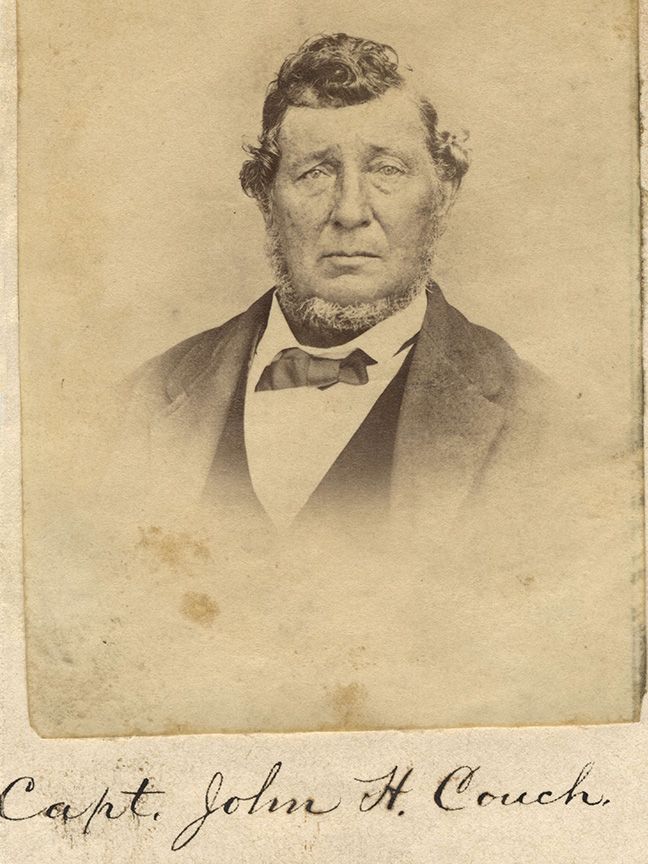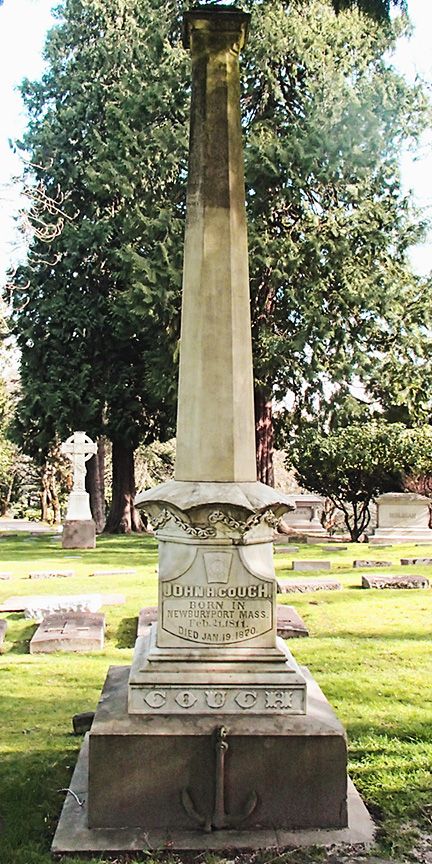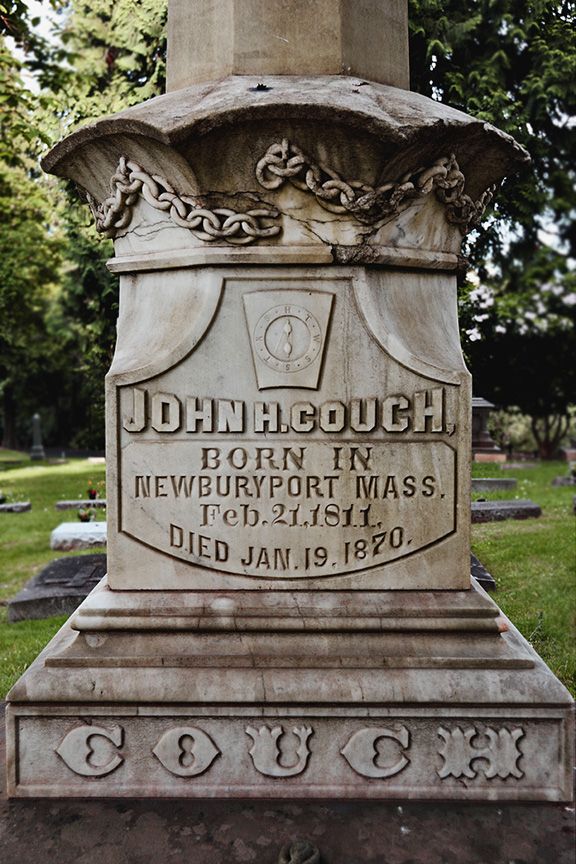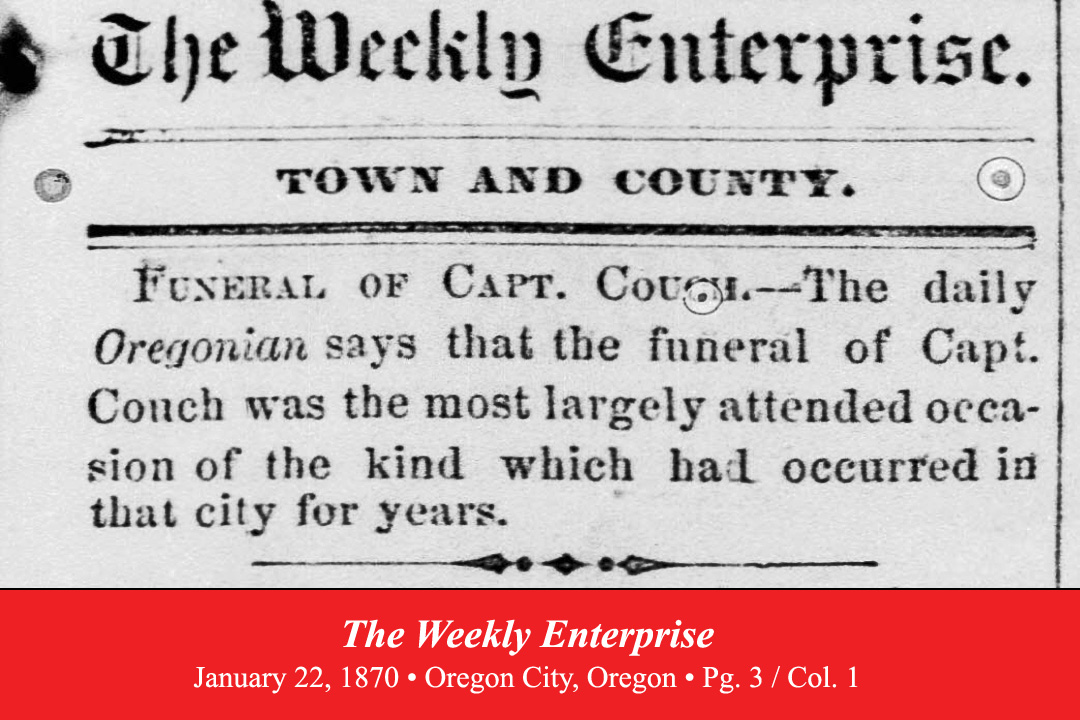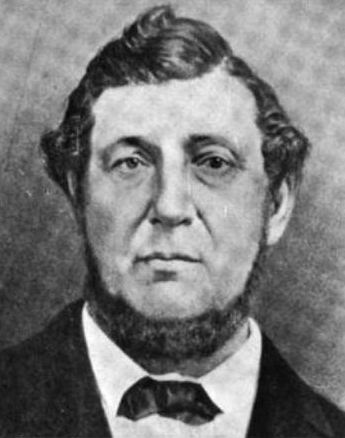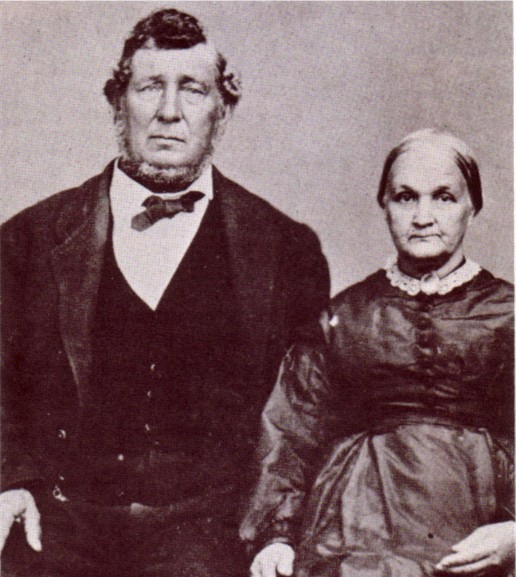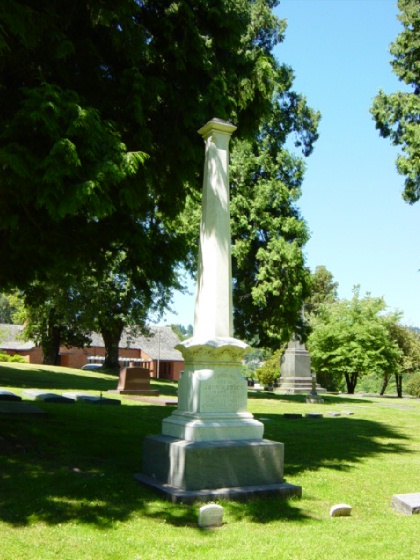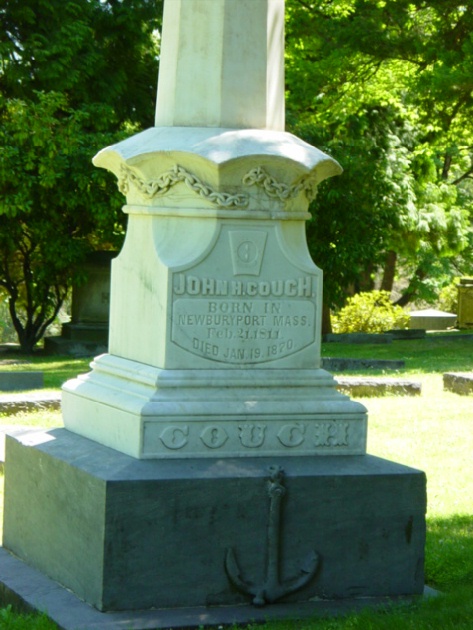Oregon City, Oregon
January 22, 1870 - pg. 2 / col. 3:
The word pioneer has and is entitled to a potent influence, and when any pioneer of a country passes away, the community in which he lived must necessarily feel that it has sustained a great loss, if he was a good man. Capt. John H. Couch, of Portland, one of the early pioneers of Oregon, has passed from time to eternity, and when such a pioneer as he was has passed away, the community at large has sustained an irreparable loss. The following short biographical sketch of the deceased is taken from the Oregon Herald of last Thursday.
Captain John H. Couch, of whom it can be said that all the ten thousand people of Portland are his friends, lies dead in his house. He was taken sick with typhoid pneumonia, on Tuesday, January 11, at noon, and yesterday morning he was no more. The flags on ships, and river steamers, and public buildings throughout the city were flying at half-mast at an early hour yesterday, and conveyed to an anxious community the sad news that an old and most respected citizen had gone from among them.
Captain Couch was born in Newburyport, Massachusetts, on the 21st of February, 1811, and was in his fifty-ninth year at the time of his death.
He chose the profession of a seamen and had risen to the responsible position of master of a vessel at an early age. In the summer of 1840 he arrived in the Columbia river in command of the brig Maryland, which had been fitted out at Newburyport by Mr. Cushing, father of Hon. Caleb Cushing. She was stowed with an assorted cargo and had on board some coopers with their tools and a supply of materials for making casks. The object of the voyage was to trade and put up salmon for a return cargo. As the Hudson's Bay Company controlled Oregon then, and were jealous of American enterprise, the venture was not a very great success, and the brig was taken to the Sandwich Islands and sold, Captain Couch going home as a passenger in another vessel. In 1842 he returned to the Columbia River in another brig called the Chenamus, after an Indian Chief of the lower river. She was owned by the same parties as the Maryland and had on board an assorted cargo which was discharged at some point on the Willamette and taken to Oregon City where Captain Couch opened a store and remained for several years. Afterwards his house was carried away by a flood. He afterwards, in 1847, returned to the East via the Sandwich Islands and China and made a third voyage to the Columbia via San Francisco in 1849; this time in the bark Madonna from New York. G.H. Flanders was first mate of the Madonna. She brought as passengers from San Francisco Benj. Stark, Charles McKay, W.H. Bennett and W.S. Ogden and arrived at Portland in August 1849. Her cargo was discharged at Portland and Captain Couch opened a store in a log house nearly opposite the present business place of Allen & Lewis in the lower end of town. Merchandise commanded extravagant prices in those days and persons who were so disposed could reap unconscionable profits. Capt. Couch, however, steadily refused to speculate on the necessities of the population. As an example, amongst the cargo of this vessel was a large supply of saleratus in papers. This article was selling in San Francisco at the time for five dollars a pound, and Captain Couch was offered $2.50 per pound for all that he had in a lump. This offer he refused, and instructed his clerk to retail the article at seventy-five cents a pound, and to be careful that it did not fall into the hands of middlemen who might demand exorbitant sums for it. Under the rule, the papers of saleratus were dealt out to consumers at a reduction of $4.25 on the price that might have been had for the asking. The reason for this course was that it was not considered fair play by the bluff, honest sea captain, to take advantage of the necessities of his fellow citizens. This anecdote illustrates the character of the man, and it is no wonder that he had no enemies in the world.
From this date Captain Couch resided continuously in Portland having taken up a land claim a portion of which now constitutes Couch's Addition to this city. He remained strong and hearty and grew in the good wishes of this fellow settlers, for he always divided with the needy what Providence enabled him to possess. Each new arrival added to the list of his friends, and now, when he is dead, the whole population of this metropolitan city will mourn as a unit, as the infant town would have done had he not been spared to witness its growth.
Before Multnomah county was set off and while yet the jurisdiction of Washington county extended to the Willamette at this point, Captain Couch was several times elected one of the Commissioners. He was Treasurer of the Provisional Government over with Governor Abernethy presided and after the United States extended its jurisdiction over Oregon, he was appointed to several offices of trust, being U.S. Inspector of Hulls, from the creation of that office here until his death. Under the State he was Pilot Commissioner and Port Warden, from the time the offices were created until his death. He was a Mason in high standing, having joined the Order many years ago, and steadily risen in the esteem of his brothers.
Captain Couch leaves a wife and for daughters (three married), and fifteen grand-children, all residents of Portland, and mourners at his grave.
Thus, full of years and honors, a good citizen descends into the tomb, regretted by the entire community in which he lived.
Oregon City, Oregon
January 22, 1870 - pg. 2 / col. 3:
The word pioneer has and is entitled to a potent influence, and when any pioneer of a country passes away, the community in which he lived must necessarily feel that it has sustained a great loss, if he was a good man. Capt. John H. Couch, of Portland, one of the early pioneers of Oregon, has passed from time to eternity, and when such a pioneer as he was has passed away, the community at large has sustained an irreparable loss. The following short biographical sketch of the deceased is taken from the Oregon Herald of last Thursday.
Captain John H. Couch, of whom it can be said that all the ten thousand people of Portland are his friends, lies dead in his house. He was taken sick with typhoid pneumonia, on Tuesday, January 11, at noon, and yesterday morning he was no more. The flags on ships, and river steamers, and public buildings throughout the city were flying at half-mast at an early hour yesterday, and conveyed to an anxious community the sad news that an old and most respected citizen had gone from among them.
Captain Couch was born in Newburyport, Massachusetts, on the 21st of February, 1811, and was in his fifty-ninth year at the time of his death.
He chose the profession of a seamen and had risen to the responsible position of master of a vessel at an early age. In the summer of 1840 he arrived in the Columbia river in command of the brig Maryland, which had been fitted out at Newburyport by Mr. Cushing, father of Hon. Caleb Cushing. She was stowed with an assorted cargo and had on board some coopers with their tools and a supply of materials for making casks. The object of the voyage was to trade and put up salmon for a return cargo. As the Hudson's Bay Company controlled Oregon then, and were jealous of American enterprise, the venture was not a very great success, and the brig was taken to the Sandwich Islands and sold, Captain Couch going home as a passenger in another vessel. In 1842 he returned to the Columbia River in another brig called the Chenamus, after an Indian Chief of the lower river. She was owned by the same parties as the Maryland and had on board an assorted cargo which was discharged at some point on the Willamette and taken to Oregon City where Captain Couch opened a store and remained for several years. Afterwards his house was carried away by a flood. He afterwards, in 1847, returned to the East via the Sandwich Islands and China and made a third voyage to the Columbia via San Francisco in 1849; this time in the bark Madonna from New York. G.H. Flanders was first mate of the Madonna. She brought as passengers from San Francisco Benj. Stark, Charles McKay, W.H. Bennett and W.S. Ogden and arrived at Portland in August 1849. Her cargo was discharged at Portland and Captain Couch opened a store in a log house nearly opposite the present business place of Allen & Lewis in the lower end of town. Merchandise commanded extravagant prices in those days and persons who were so disposed could reap unconscionable profits. Capt. Couch, however, steadily refused to speculate on the necessities of the population. As an example, amongst the cargo of this vessel was a large supply of saleratus in papers. This article was selling in San Francisco at the time for five dollars a pound, and Captain Couch was offered $2.50 per pound for all that he had in a lump. This offer he refused, and instructed his clerk to retail the article at seventy-five cents a pound, and to be careful that it did not fall into the hands of middlemen who might demand exorbitant sums for it. Under the rule, the papers of saleratus were dealt out to consumers at a reduction of $4.25 on the price that might have been had for the asking. The reason for this course was that it was not considered fair play by the bluff, honest sea captain, to take advantage of the necessities of his fellow citizens. This anecdote illustrates the character of the man, and it is no wonder that he had no enemies in the world.
From this date Captain Couch resided continuously in Portland having taken up a land claim a portion of which now constitutes Couch's Addition to this city. He remained strong and hearty and grew in the good wishes of this fellow settlers, for he always divided with the needy what Providence enabled him to possess. Each new arrival added to the list of his friends, and now, when he is dead, the whole population of this metropolitan city will mourn as a unit, as the infant town would have done had he not been spared to witness its growth.
Before Multnomah county was set off and while yet the jurisdiction of Washington county extended to the Willamette at this point, Captain Couch was several times elected one of the Commissioners. He was Treasurer of the Provisional Government over with Governor Abernethy presided and after the United States extended its jurisdiction over Oregon, he was appointed to several offices of trust, being U.S. Inspector of Hulls, from the creation of that office here until his death. Under the State he was Pilot Commissioner and Port Warden, from the time the offices were created until his death. He was a Mason in high standing, having joined the Order many years ago, and steadily risen in the esteem of his brothers.
Captain Couch leaves a wife and for daughters (three married), and fifteen grand-children, all residents of Portland, and mourners at his grave.
Thus, full of years and honors, a good citizen descends into the tomb, regretted by the entire community in which he lived.
Gravesite Details
Captain John H. Couch and his wife Caroline Flanders Couch were originally buried at Lone Fir Cemetery, however, their remains were reinterred at River View Cemetery on April 7, 1920 with signed permission by Caroline Wilson Flandlers.









